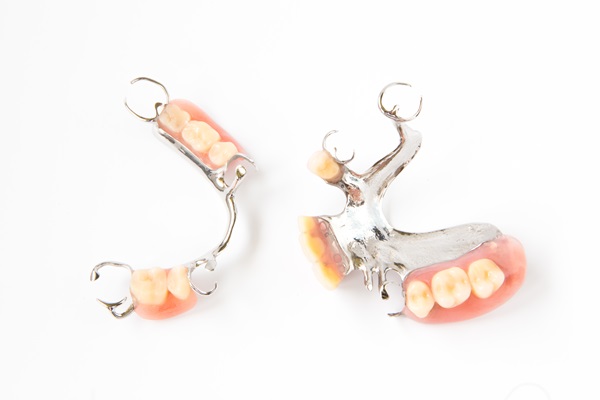 In addition to recognizing the new person in the mirror, adjusting to new dentures requires changing some of a person’s former eating habits. Having a full set of great-looking teeth can give one’s confidence a significant boost, but after spending a considerable amount of time without teeth, it can take a little while to learn how to use them. The first few weeks of eating with dentures may seem unnatural, but a few simple tips can help it feel routine in no time.
In addition to recognizing the new person in the mirror, adjusting to new dentures requires changing some of a person’s former eating habits. Having a full set of great-looking teeth can give one’s confidence a significant boost, but after spending a considerable amount of time without teeth, it can take a little while to learn how to use them. The first few weeks of eating with dentures may seem unnatural, but a few simple tips can help it feel routine in no time.
5 eating tips for adjusting to new dentures
By being patient and following some simple advice, new dentures will feel like a natural set of teeth in just a little while. These practical tips can help with the transition period.
1. Start off slowly
Having a full set of teeth opens up many culinary doors, but it is wise to wait a few days before getting too creative with dining options. It is a good idea to start with a soft or liquid-based diet for the first week. Not only will the sensation of chewing be new to the mouth, but the gums may also be sensitive and tender. Protect the gums by giving them some time to adjust before exploring a wide range of foods.
2. Distribute food evenly
Many people have chewing preferences, often choosing to chew on one side of the mouth over the other. With dentures, this can increase the likelihood of the appliance moving and slipping out of place. Focus on distributing food evenly through the mouth and chewing on both sides equally. Start by chewing slowly, moving toward a more comfortable pace as dentures remain stable.
3. Wait on hot liquids
The morning cup of coffee that has been so routine may need to wait a few days or at least be consumed more slowly. Dentures have an insulating quality that can increase the sensation of heat. Start slowly with hot drinks or soups to test whether or not they are cool enough to consume.
4. Take small bites
Catching up on all the food that was nearly impossible to eat without teeth is exciting, but taking things too fast can cause discomfort. To enjoy these foods, cut them up into small, bite-sized pieces. This can reduce the pressure or sensation on the gums while transitioning into the motion of chewing. It is also important to consider the tenderness of the food being eaten. Tough meats, like steak or other red meat, should be slowly cooked or stewed to avoid problems when adjusting to new dentures.
5. Watch for sticky foods
Gum, peanut butter, candies, and some berries are prone to get stuck between the gums and dentures. When this happens, it can increase the likelihood of gum irritation or infection. These foods can be enjoyed, so long as the dentures and mouth are thoroughly cleaned afterward.
Conclusion
Adjusting to new dentures takes a little bit of time and patience. However, once the transition period has passed, a wide world of dining options opens.
Request an appointment or call San Dimas Family and Sedation Dentistry at 909-305-2300 for an appointment in our San Dimas office.
Recent Posts
Adjusting to new dentures is a process that usually takes several weeks. You must learn how to eat, speak, and adapt to the feel of having them in your mouth. Though every effort is made to have your dentures fit correctly when they are made, you are likely to need to visit your dentist for…
Most first-time denture candidates are nervous about adjusting to new dentures. They usually do not know what to expect, and they may wonder if dentures will feel natural.People get dentures for many reasons, such as broken or missing teeth, excessive tooth decay, gum disease, severe tooth pain or trauma, and painful sensitivity to hot and…
Getting new dentures can be a simultaneously exciting and daunting process. Although adjusting to new dentures takes some time and work, patients can immediately begin to enjoy the positive results of a full smile and a more rounded-out face. However, some aspects of adjustment may require a bit more practice. Chewing becomes somewhat different with…


